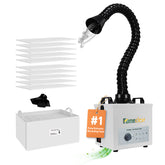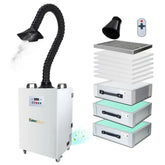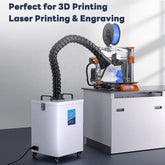✈ Free Shipping for US Orders and Ship from US
Subscribe to get 5% off for Your First Order, Code:FUMECLEAR
FC-350 Laser Fume Extractor
Popular Products
- From $258.99 USD
$289.99 USD- From $258.99 USD
- Unit price
- / per
- $749.99 USD
$1,159.99 USD- $749.99 USD
- Unit price
- / per
- From $368.99 USD
$418.99 USD- From $368.99 USD
- Unit price
- / per
-
2002-Light Grey
-
Black-FC-2002A fume extractor with exhaust
FC-350 Laser Fume Extractor
Popular Products
- From $258.99 USD
$289.99 USD- From $258.99 USD
- Unit price
- / per
- $749.99 USD
$1,159.99 USD- $749.99 USD
- Unit price
- / per
- From $368.99 USD
$418.99 USD- From $368.99 USD
- Unit price
- / per
-
2002-Light Grey
-
Black-FC-2002A fume extractor with exhaust
Laser Fume Extractors
Laser engraving/cutting/marking fume evacuator
Lasers can engrave, cut or mark by vaporizing target materials with a high-energy beam. Smoke and gases are by-products of this process. These are collectively called laser smoke. Laser fumes are composed of respirable dust and volatile organic compounds (VOCs). Fumeclear's five-stage high-efficiency filter unit improves indoor air quality by capturing smoke directly at the source and recirculating purified, clean air back to the work environment. A simple dust collector is not enough. You need a comprehensive smoke removal solution for laser smoke. Great for laser engraving and laser cutting.
Systems Starting at $799
|
|
|
Fumeclear® FC-350 |
Fumeclear® FC-700 |
 |
 |
Fumeclear®XL-300 |
Fumeclear®XL-500 |
Laser Fumes Are Made Up of Two Components:
1. Respirable dust:
All laser marking, engraving, and laser cutting systems (C02, fiber, and YAG lasers) unavoidably generate respirable dust (2.5 microns and less in diameter). Given their small diameter, the individual dust particles are invisible to the naked eye but can usually be seen as smoke in high concentrations. Respirable dust can penetrate deep into the lungs and increase health risks. However, high-quality, performance-tested HEPA filters can remove respirable dust from the air, therefore making the air safe to breathe. FIltrabox uses high-performance HEPA filters with an impressive tested efficiency of 99.999% @ 0.3 microns. This means that it removes 99.999% of the most aerodynamically penetrating particles, known to be 0.3 microns, while smaller and larger particles are even more effectively captured, resulting in extremely clean air, free of respirable dust.

2. Volatile Organic Compounds / VOCs:
Volatile Organic Compounds, also known as VOCs, are the gaseous component of the contaminants emitted during the laser vaporization of most materials. Sustained exposure to high concentrations of VOCs is a health risk. Most VOC molecules will physically bond to the activated carbon’s network of microscopic pores. This is called adsorption. Some other VOCs require alternative chemical treatments to deactivate them. Filtrabox’s blend of both high-performance activated carbon adsorption media and potassium permanganate chemical treatment media offers the broadest range of laser VOC protection available.

Activated carbon is very porous. Three types of pores exist in activated carbon. These pores capture and retain contaminants within them.
- Micropores: the radius is smaller than 1 nanometer (best for gas molecules).
- Mesopores: the radius is 1-25 nanometers
- Macropores: the radius is larger than 25 nanometers
Carbon types with a high proportion of micropores are best for adsorbing gas molecules. We use coconut shell-activated carbon which has the highest micropore content.
- Choosing a selection results in a full page refresh.































